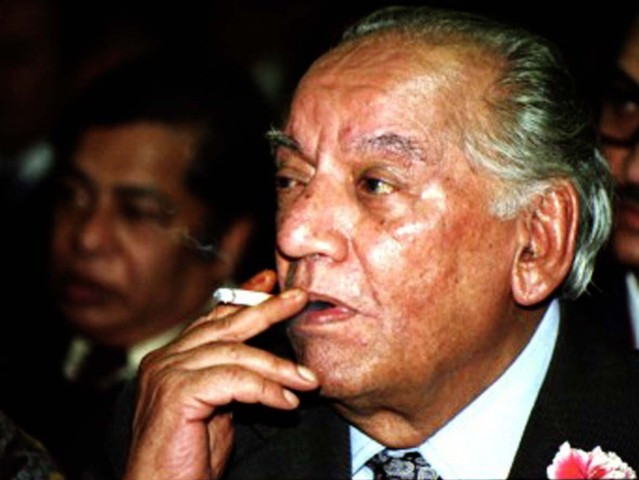It was really late in life when I started reading and appreciating poetry beyond text books. Like a typical teenager I started off by reading Wasi Shah – kash main tere haseen haath ka kangan hota – fame. There was no looking back and I began delving deep into the ocean of poetry and realized how much I had missed.
I can’t accurately recall how I stumbled upon Faiz’ poetry; his work was not a part of Urdu syllabus because of his rebellious thoughts. As much as I remember, Q. U Shahab’s autobiography Shahabnama acted as a catapult, where he had quoted that famous couplet:
Aye kuch abr, kuch sharaab aye
Iss ke baad aye jo azab aye
Even before reading Shahabnama, Faiz’ name was quite familiar to me – thanks to PTV for transforming many of his poems into evergreen songs. The great play of yesteryears Dhoop Kinare where the protagonist (Rahat Kazmi) was shown reading and listening to Faiz’ poetry also played part in glamorizing couplets like
raat youn dil main teri khoi hui yaad aaye / jaise weerane main chpke se bahar aajaye
jaise sehraaon main holay se chale baad-i-naseem / jaise beemar ko baywajah qarar aajaye
Faiz’ poetry holds impeccable appeal for its sophistication on one hand and simplicity on the other. It boggles my mind that how easily yet in piercing manner one can convey his thoughts such as:
Ker raha tha gham-i-jahan ka hisaab
Aaj tum yaad bay hisaab aye
Faiz gave new meaning to a moonlit night:
So rahi hai ghanay darakhton per
Chandi ki thaki hui awaz
Yes, only Faiz can convey a thought like this:
Faiz zinda rahain woh hain to sahi
Kya hua gar wafa shuaar nahi
It is inevitable to associate a person’s refined tastes with reading Faiz. If someone reads and quotes him often in their conversation means that person, arguably, has a touch of elegance. It is just like when someone appreciates opera or Beethoven which is bound to go over the heads of most of the listeners but you can tell about that listener’s great taste.
Faiz was basically a revolutionary poet for he has written mostly for the poor, persecuted and, crushed junta. His poems and anthems like Bol ke lab azad hain tere and Hum daikhain gey come to life every time the winds of change blow in the motherland. The last time, his poems and songs were quoted and played with great zeal during the Lawyer’s Movement for the restoration of Chief Justice. But unfortunately the real people for whom Faiz wrote are oblivion to his existence or of his poems for that matter. You go on the streets and ask the poor vendor about him, he would fail to tell you who Faiz was. This makes one wonder whether Faiz really was an awami poet (the poet of ordinary people) or he like the great Chugtai and many others has become the favorite subject of drawing room discussion only. Faiz’ words resonate realism which makes him the favorite poet of all times and although the ordinary man on the street of Pakistan may not know him that doesn’t shake Faiz’ stature as a great contemporary poet of Pakistan’s history. That’s true the more you read Faiz, the more you yearn for his poems.



COMMENTS
Comments are moderated and generally will be posted if they are on-topic and not abusive.
For more information, please see our Comments FAQ